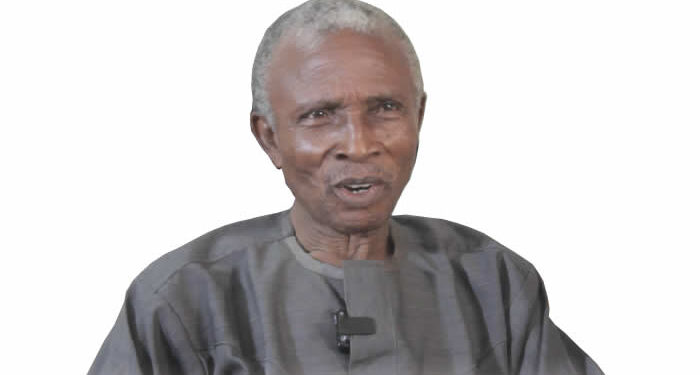Pa Yemi Ogunderu, father of Richard Ogunderu, recounts the shocking events of 1993 when his teenage son, alongside three other young men, hijacked a Nigerian Airways plane. Their daring protest was a response to the annulment of Nigeria’s 1993 presidential election, believed to have been won by the late MKO Abiola. In this interview with Envision News Online, Pa Ogunderu reflects on his son’s motives, the ensuing family turmoil, and the price his son paid in the name of democracy.
Tell us about yourself. My name is Yemi Ogunderu. I’m a simple, peace-loving man who enjoys meeting people. I’m also a father and a grandfather, cherishing a quiet life.
In 1993, your son Richard became widely known for hijacking a plane in protest. How old was he at the time? Richard was just 19, born in August 1974. Today, he’s around 48 years old. At that time, he dreamed of becoming an aeronautic engineer.
Did Richard discuss his hijacking plans with you beforehand? Not at all—it was a complete shock. Richard never hinted at anything remotely like that.
How did you learn about the incident, and what was your reaction? It was the biggest shock of my life. Richard wasn’t a violent child; he was easygoing and a lover of peace. I couldn’t believe he’d do such a thing.
So, you never expected him to take such a daring step? Exactly. He was gentle, loved to dress well, and was brilliant. He’s also very strong-willed, someone who sticks to his beliefs unless proven otherwise with solid reasoning.
What position is Richard among your children? Richard is my second child and my only son among five children. We shared a deep bond—more like brothers than father and son. I never thought he’d keep anything major from me, except, apparently, this hijacking plan.
Did he ever discuss his career goals with you? Yes, he told me he wanted to be an aeronautic engineer. I researched the options and found that no schools in Nigeria offered that course. So, I suggested joining the Air Force as a stepping stone, but he wasn’t interested in anything military-related. At the time of the incident, we were looking for ways to get him into a foreign institution for his studies.
Did you know his three friends before the incident? I’d only met one of them briefly, Kabiru Adenuga, but had no real interaction with any of them.
After the hijacking, your son and the others were jailed in Niger Republic for nine years. How long was it before you saw him again? I first heard of the hijacking on the news. When I found out Richard was involved, it was devastating. Later that day, the military intelligence unit arrested me, likely due to my connection to Richard. I spent 70 days in detention without knowing my exact location until I learned I was at Bonny Camp. I was finally released after they confirmed I had no prior knowledge of Richard’s plan.
Were you allowed any communication during your detention? Not immediately. My family eventually found out I’d been detained, but they were in the dark at first. During my detention, I faced interrogation panels where I learned more details about Richard’s case.
When did you see Richard again? I first visited Richard in January 1994, in Niger Republic. I made my way there by road and connected with a local human rights organization that helped me. The organization’s president even accompanied me as an interpreter. Meeting Richard was emotional—he hugged me, and it was a powerful moment.
Did he express any regret for his actions? No, he hasn’t. He only regrets not staying back in Niger, where he’d made a name for himself by setting up a prison library and a mini-school, even earning awards.
Were you present for his trial? Not fully, but I kept close tabs. They were treated civilly in Niger and seen as prisoners of conscience rather than common criminals. However, their lengthy detention without trial eventually drew international attention. The authorities seemed to carry out a trial mainly to justify the prolonged detention, just before releasing them. Had the late General Abacha still been in power, Richard might never have returned to Nigeria safely.
How was the reunion after his release? It was wonderful but bittersweet. Richard had built connections and been offered scholarships in Niger, but he missed home and wanted to return. Sadly, upon his return, he found the situation here discouraging.
What has he been up to since his return? He worked briefly with PRONACO, a movement under the guidance of leaders like Chief Anthony Enahoro and Professor Wole Soyinka.
We heard he was recently attacked. Could you share what happened? Yes, it’s true. Some men—unidentified soldiers—attacked him, breaking his kneecap. We tried one surgery, but it was poorly done, leaving one leg longer than the other. He now needs a major surgery costing about N4.5 million, along with comprehensive rehabilitation. Unfortunately, the incident and his circumstances have led to depression, and we’re seeking support for his treatment.
Looking back nearly 30 years, do you think your son’s actions were worth it, given Nigeria’s current state? That’s a question every Nigerian should reflect on. What those young men did was almost a suicide mission; they had no real weapons, just toy guns. Had the military on board retaliated, they might have lost their lives. But they believed in their cause, and today, seeing Nigeria’s ongoing challenges, it’s hard to say if it was all worth it.
























